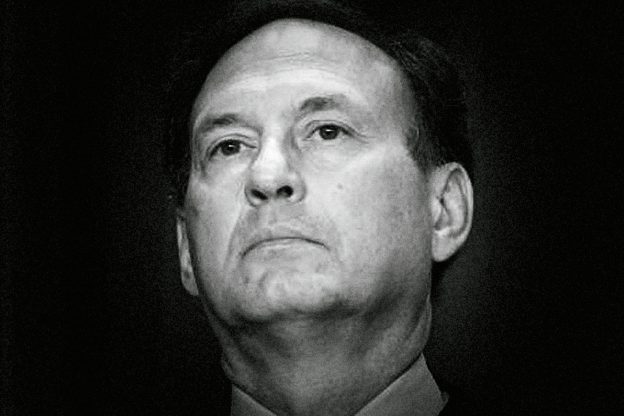

Always believe the first draft
The first draft of almost anything is the most pure, honest expression of an author’s intent. It’s where all the wildly inappropriate — or worse — thoughts are laid down. That’s what you will find in the leaked draft opinion in Dobbs v. Jackson Women’s Health Organization.
It’s the unvarnished Justice Samuel Alito. Ninety-eight pages of bilious, misogynistic Sammy.
In an absolutely magnificent irony, Chief Justice John Roberts huffed and puffed about the invasion of the court’s privacy in a case about — privacy. And he said the court would get to the bottom of it.
The Roberts Court name may in decades to come be spit out like the Taney Court — an epithet, and not a positive one, either. He does well to be concerned. When a third of his court was appointed by Donald Trump and resembles bacteria cultivated in a Federalist Society petri dish, and with another couple of justices not much different, there may not be much he can do.
There is some informed speculation that the leak came from the conservative side of the court, in an effort to lay down a marker and make it harder to try to put lipstick on the pig, which the chief justice would be interested in doing. Here’s the beginning of a Twitter thread by a law professor at Yale who clerked at the Supreme Court.
I clerked at the Supreme Court. Last night, I assumed a liberal clerk leaked the draft opinion overturning Roe. Now I think MUCH more likely it was leaked by a conservative fanatically committed to every word of Alito’s monstrous opinion. **🧵**
— Amy Kapczynski (@akapczynski) May 3, 2022
Please read the thread through; it’s worth your time.
The draft opinion is awful; it’s dreck. You can find many articles that say so; you don’t need to hear more from me. Except maybe one teeny point. In arguing that criminalizing abortion was a thing, like forever, Alito quotes an Englishman:
Two treatises by Sir Matthew Hale likewise described abortion of a quick child who died in the womb as a “great crime” and a “great misprision.” See M. Hale, Pleas of the Crown: Or, A Methodical Summary of the Principal Matters Relating to that Subject 53 (1673) (P. R. Glazebrook, ed., 1973); 1 M. Hale, History of Pleas of the Crown 433 (1736) (Hale).
Who is Sir Matthew and why does he deserve a footnote in a Supreme Court decision? We turn again to Twitter. Please read the whole thread.
Justice Alito’s invocation of Sir Matthew Hale in his leaked majority opinion is so, so much more fucked up than people realize. I’m a professor with a PhD, and my area of expertise happens to be women and gender in the early modern era (1500-1700). Here is what you need to know. pic.twitter.com/MfMSi1g4D2
— Dr. Literature_Lady 💌📚📜🎙 (@Literature_Lady) May 5, 2022
Shorter Dr. Literature Lady: Sir Matty was a spittle-flecked, raving misogynist who hated any woman who was not under the thumb of a man, not infrequently calling them witches. Hale was not the sort of guy a woman would be inclined to start a conversation with, “You know, Matt, I’d like to have a conversation with you about your views on abortion.”
I am sure that such an ice breaker with Alito would go just as well. At least Alito couldn’t have you burned at the stake. Not yet, anyway.
Matthew Hale lived in a man’s world; that’s why relying on centuries of misogyny as proof of what was deeply rooted in society is so messed up. “We’ve treated women badly for centuries; we must keep it up,” says Alito.
There is obviously another long history here, just as valid, just not as well published, of women, and a few men, trying to help women coping with bearing children when it was unbearable.
Moreover, concern over abortion was not as uniform and fervent as Alito would like you to think. From an article in the Guardian, by Dartmouth theologian Randall Balmer:
Although leaders of the religious right would have us believe that the Roe decision was the catalyst for their political mobilization in the 1970s, that claim does not withstand historical scrutiny. What prompted evangelical interest in politics, in fact, was a defense of racial segregation.
Evangelicals considered abortion a “Catholic issue” through most of the 1970s, and there is little in the history of evangelicalism to suggest that abortion would become a point of interest. Even James Dobson, who later became an implacable foe of abortion, acknowledged after the Roe decision that the Bible was silent on the matter and that it was plausible for an evangelical to hold that “a developing embryo or fetus was not regarded as a full human being”.
Balmer lays out some persuasive evidence in the article. (With thanks to @DavidNeiwert for linking the article.)
– o O o –
What lesson to draw from this? Sammy Alito dresses up like a smart person — no ermine, though — but don’t let it fool you.
– o O o –
Update 5/7: Here’s a ProPublica article about Sir Matthew Hale that is more complete than the Twitter thread that was linked above. It’s very good. He was quite a guy, and I mean guy. He was a jurist who made the law in his own misogynistic image. Which is what Alito wants to do, too.
Thanks to occasional LeftMN writer Rob Levine for calling it to my attention.
– o O o –
More on the possible source of the leak.
Nina Totenberg on source of SCOTUS leak: “The leading theory is a conservative clerk who was afraid that one of the conservatives might be persuaded by Chief Justice Roberts to join a much more moderate opinion.” pic.twitter.com/TWzQmA1Uqm
— Aaron Rupar (@atrupar) May 8, 2022
Thanks for your feedback. If we like what you have to say, it may appear in a future post of reader reactions.

